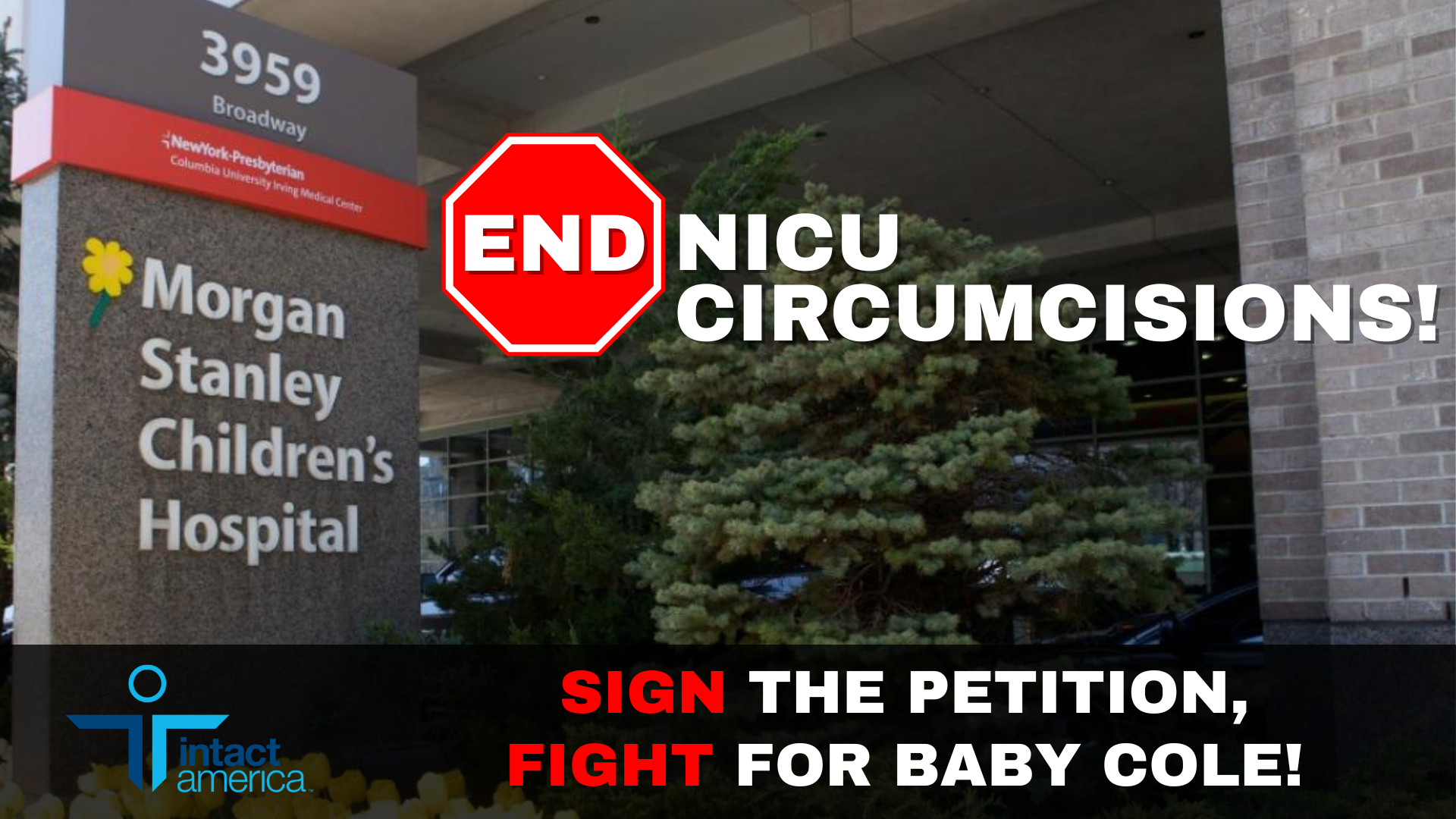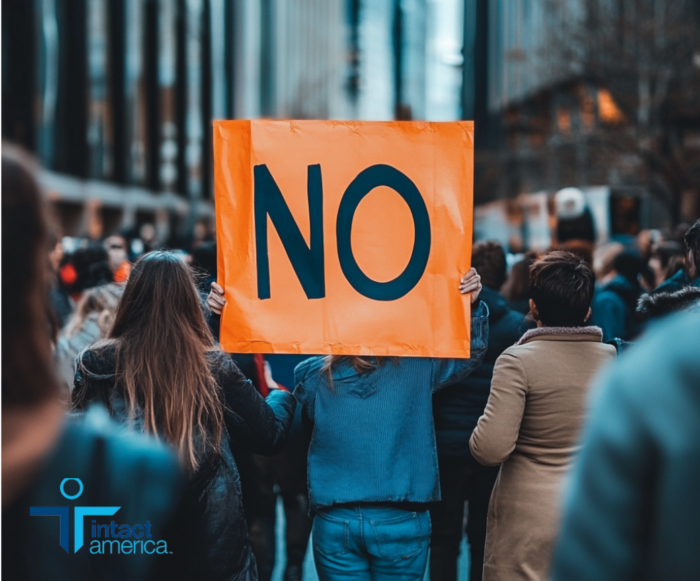
Intactivists often argue about whether or not we should be calling for laws prohibiting infant circumcision, or whether we should pursue interim steps of “harm reduction” in the form of more detailed informed consent, which– in theory at least– would make some parents decide against circumcising their babies.
The merits of a legal ban are a topic for another day. But I argue that efforts spent developing better consent forms are efforts wasted. We know
that doctors and nurses spend little time actually informing patients about the risks of circumcision, that patients almost never decide to forego a treatment because of what a consent form says, and that – most important – parental consent, no matter how “informed,” is not valid for a medically unnecessary procedure.
Think of it this way: If you take your daughter to a doctor, and tell that doctor you want your baby to look like you, and that you lost a finger in an accident many years ago, will the doctor say, “No problem – I’ll cut off her finger, so long as you’re willing to sign a consent form detailing the pain and risk of infection from the surgery”? Not likely; chances are better you’d be reported to Child Protective Services. (Please, please don’t try telling me that cutting off one of your daughter’s fingers is way worse than cutting off the most sensitive part of your son’s penis.)
So, consent forms aren’t the way to go.
But here’s a form of “harm reduction” I can get behind. I’ll call it “don’t ask, don’t sell.”
I just listened to an interview on National Public Radio with Thomas Farley1, New York City’s health commissioner. Farley was talking about his newest proposal that would require stores to keep cigarettes away from public view – not just in the current Plexiglass cases (which, in my opinion, do more to discourage theft than smoking), but out of sight altogether.
Here’s how it would work for circumcision: Doctors, nurses, midwives, and all other medical professionals and hospital staff would be prohibited from offering circumcision, or even bringing it up. If, as doctors often claim, it’s really the parents who push for the procedure, not mentioning it shouldn’t be a problem. Let the parents raise the topic first; then, and only then, would the doctor be permitted to discuss circumcision. And, of course, the doctor would be required to tell the parents the truth – that it’s not only unnecessary, but painful and risky to cut off a baby’s foreskin.
If this seems like a revolutionary concept, it’s because circumcisions are sold all the time.
A nurse walking down a hospital hallway, peeking into the rooms of new mothers and asking, “Will we be needing a circumcision here?” – that’s selling.
Handing a blank circumcision consent form to a pregnant woman during a prenatal care visit – that’s selling.
Including a circumcision form in the packet of papers a woman is asked to sign when she’s admitted to the hospital or (even worse) when she’s in labor or in a postpartum fog – that’s selling.
Countless mothers have told me they never gave circumcision a thought until their obstetrician brought it up. Countless parents, including Intact America’s founding donor, have told me they were pressured and solicited many, many times – first by obstetricians and later by hospital nurses – to circumcise their sons. Social media (blogs, the Facebook pages of Intact America and The Whole Network, Twitter) is replete with accounts from parents who were lied to; coerced into believing that circumcision is painless, quick and desirable; and harassed into fearing their son would hate them (and live a miserable existence) if they did not have him circumcised.
Without a doubt, these shameless, financially motivated sales tactics – as opposed to some innate desire of parents to see their newborn sons surgically altered – are what drives the demand for circumcision in this country.
You don’t need to look too hard to find support for the “don’t ask, don’t sell” concept. Here’s what Opinion 2.19 of the Code of Ethics of the American Medical Association2 says:
Physicians should not provide, prescribe, or seek compensation for medical services that they know are unnecessary.
Nobody, not even the AAP in last year’s scientifically and medically bankrupt Task Force Report on Infant Circumcision, dares to claim that routine infant circumcision is medically necessary.
Of course, “don’t ask, don’t sell” won’t wipe out circumcision overnight. Some parents will still ask doctors to surgically reduce their son’s penises. If that occurs, it’s a doctor’s duty to inform those parents that circumcision is not necessary; that it causes the baby pain and distress; that it interferes with breastfeeding and maternal-infant bonding; that it can cause infection and hemorrhage; and that a number of babies die each year as a result of having been circumcised.
But it’s a safe bet that many others won’t even think to bring it up, any more than they would ask the doctor to remove their daughters’ labia—or finger. And more and more boys will grow up intact, so that, just one generation later, the argument for looking like Dad can have a new, natural result!
Primum non nocere (“first, do no harm”) hasn’t gotten us very far in ending circumcision. So let’s try this:
Ne quaeras noli vendere. Don’t ask, don’t sell.
Georganne Chapin
1. http://m.npr.org/news/Health/175119412?start=90
2. http://www.ama-assn.org/ama/pub/physician-resources/medical-ethics/code-medical-ethics.page









Dan Bollinger
March 27, 2013 4:21 pmI think that’s a smart approach. It is oh, so, reasonable. Who could complain? The circumcision rate would plummet. Two factors that would instantly come into play are that it would be difficult to monitor if they really did stop selling circumcision. The other is that we would have to insure that all those intact boys are receiving good penile care, for instance not forcibly retracting the foreskin.
Alfred Schram
March 27, 2013 9:46 pmYou (Dan Bollinger) made a valid point. Although I am in favor of the approach,
I cannot trust the AAP to tell its members to list the risks. Their August 2012 statement clearly shows how they were able to shift to the parents the blame for all problems resulting from infant circumcision.
Janet Tilden
March 27, 2013 4:32 pmExcellent advice… much more practical than the alternative course of trying to ban circumcision altogether and being accused of infringing on parents’ religious beliefs. “Don’t ask, don’t sell.” I like it!
Bettie M.
March 27, 2013 5:31 pmNo need to infringe on parents’ religious beliefs. Just ban secular circs and continue permitting the religious (Jewish and Moslem) procedure. Win – win. (Sort of.)
circesadreim
March 27, 2013 6:28 pmEven religious circs need to stop. If people disagree with this, then perhaps the ban on female cutting should be lifted. Otherwise, to allow cutting to be done to boys for religious purposes, but to protect girls from the same thing, is a blatant violation of the constitution. And human rights, of course.
Aubrey Terrón
March 27, 2013 4:51 pmWishing I could show the world the steaming pile that the AAP just put in their newsletter “Medical-legal risks associated with circumcision of newborn males: need for revised consent” NOT by a legal professional, but an M.D., about how hospitals might be liable if they DON’T “inform” parents of their option to circumcise, but… you have to be a member to read it. Typical grasping at straws to stop the income drop that is the falling rates of circumcision. Pathetic.
Michelle Storms (@stormscloud)
April 2, 2013 9:15 pmAnd now is the time for the attorneys to respond to this craziness.
Joseph Lewis
March 27, 2013 5:25 pmWithout medical or clinical indication, how is it doctors can even be performing surgery on healthy, non-consenting minors, let alone be eliciting any kind of “decision” from parents? Let alone expect to be reimbursed by public coffers?
I’m afraid that infant circumcision is charlatanism, and American justice systems seem to be purposefully looking the other way.
Bettie M.
March 27, 2013 5:30 pmInteresting article. Re your statement “financially motivated”, though, I am not so sure. I was offered, under medicare, a free circumcision for my just-born-and-not-even-cleaned-up baby that would have “earned” the Dr. $19.50. That is what the govt was paying at the time.
Now that infant circumcision has been defunded in my neck of the woods, parents go to a day clinic to get the deed done, and pay much, much more. Yes, a fair number of parents DO want it. Parents are fixated on genitals more than ever, if anything, and its normalcy in their particular circle, and I can back up this statement but this is “a topic for another day”.
Jerry Norton
March 30, 2013 12:25 amAgree with your assessment of parents fixated on their sons’ normal penises. It is really quite dangerous, incomprehensible and unexplainable by any normal avenue of reasoning. The closest plausible explanation I have heard is from Harvey Cox (Professor of Divinity at Harvard College) in his book Sex and Secularization (1965). I found it on Hugh Young’s Circumstitions website a long time ago:
No aspect of human life seethes
with so many unexorcised demons as does sex.
No human activity is so hexed by superstition,
so haunted by residual tribal lore,
and so harassed by socially induced fear.
Jerry Norton
March 30, 2013 12:33 amForgot to say I don’t know that a doctor’s fee isn’t sometimes substantially higher, but can you imagine exposing yourself to that liability for 20 bucks? Not to mention ill karma. Not to mention someday one of his victims may find him and inflict serious bodily injury on him.
Why do they do it? I saw an Australian TV program where one doctor claimed 30,000 male circumcisions over his lifetime. That’s a good sized small city of 60,000 folks. How does one man ever get that much power? Why do we give it to him? Do you think it’s a power trip thing?
I just can’t imagine doing it. I can’t imagine having amputated penis parts of thousands of adult men. How do we create these monsters? I think of caregivers as some kind of body snatchers. They look like normal people until a baby is born and then they become hell bent on that foreskin. Then they go back to behaving like normal doting caregivers until another male is born into the extended family. I’m describing my family – it’s creepy!
Bettie M.
April 10, 2013 11:19 pmJerry, I know a woman whose anxiety on seeing the intact penis of a relative’s baby was bizarre: during a visit, she followed the mother around the house til the kid needed his diaper changed and insisted on watching. When she saw the normal organ she nearly went crazy. Could I make this up. My analysis is that she had come to realize how bad circ was for her own son and wanted to see more cut ones to assuage whatever she had left for a conscience.
Roger Howard
April 11, 2013 1:10 pmPer Bette M.’s comment… i believe, from my own observation of the reactions from circumcising-parents, that the parents of circumcised children desperately want to see everyone else’s children circumcised. From that point on…I believe it would make for fascinating psychological studies.
John Geisheker
March 27, 2013 6:14 pm“Don’t ask, don’t sell,” is precisely the technique that New Zealand doctors used to discourage, and eventually eliminate, infant circumcision there in the late 1960’s. When parents asked –and of course some would– they were told, “we don’t do that any more.” It was just that simple. It would require nothing more than a press release from the AAP to begin this process, and of course, some careful attention to bioethics on the part of clinicians. But we are not there yet in the USA.
(New Zealand children, btw, are among the healthiest in the world, with access to full medical care for their lifetime, in a country with tax rates no higher than the U.S.)
Those who cling to the notion that a comprehensive consent form might dissuade parents should also consider that a comprehensive consent form, listing all manner of poor results, (over a hundred at last count) allows the clinician to say, “”I told you there were risks.” In the legal setting this allows the clinician to claim full disclosure, and suggests to the jury that the parents knew what they were doing. Of course, a lengthy consent does not cover for outright negligence, but, in practice, it is persuasive and exculpatory.
See how poorly circumcision is regulated here:
http://newmalestudies.com/OJS/index.php/nms/article/view/60
John V. Geisheker, J.D., LL.M.
Executive Director,
DoctorsOpposingCircumcision.org
Seattle, Washington
Michelle Storms (@stormscloud)
April 2, 2013 9:09 pmWhen my husband and I have attempted to give full informed consent to parents, the parents often get quite upset and refuse to listen to all the horrible things that can happen including death. We have been accused of inflicting emotional harm onto parents. Of course, it was all our fault and couldn’t possibly be about the actual harms of the procedure!!!!
Forcing physicians to bring up circumcision to parents would open up the AAP to huge liability.
Gianluca
March 27, 2013 7:02 pmI totally support it. I read though that the AAP wants to go into the opposite direction and actually make it a felony when a doctor does not mention circumcision because of the stated “benefits”:
http://aapnews.aappublications.org/content/34/4/1.1.extract
Do you think that this might have any effect on how doctors will advise future parents?
Unfortunately, the United States is going into the opposite direction than other Western countries in this respect 🙁
Dan Bollinger
March 28, 2013 1:10 pmGianluca, The article just goes to show the AAP’s interest in this lucrative trade, but most importantly, it shows their true color: Most surgeries and treatments have some sort of “benefit.” That doesn’t mean you can solicit people for them. What’s next? Solicit parents to let them perform a quadruple bypass on their kid, after all, it has value!
Hugh Intactive
March 27, 2013 8:43 pmJohn Geisheker has it quite right. It was called the “Sleeping Dogs” policy as in “Let sleeping dogs lie”.
wildwahinepaddler
March 27, 2013 9:06 pmI think it’s a great idea! Often written on the white board in labor and delivery rooms is “circumcision”….. which suggests that it is a valid medical procedure….that many parents won’t question. Back in 1979…… I was asked for my signature on a circumcision consent form….and when I asked if it was necessary…..I was told if the father is, the son should be and it’s not a big deal to do one. Complete and total lies…….I wish they would have shown a circumcision video because I know it would have changed my mind. Of course that would be considered too graphic……. too graphic? And it’s done to a newborn? I’m all for this campaign to not “sell” this unnecessary traumatic and barbaric surgery done on un consenting children.
Roger Howard
March 27, 2013 10:40 pmI agree with Chapin in the broadest sense, but I don’t think the comparison to amputation of a finger is helpful to our cause.
Georganne Chapin
March 28, 2013 4:45 pmHmm. What body part would be a good comparison, Roger?
davebradt
March 29, 2013 1:40 pmFinger is good. Also mastectomy. A small procedure that is easy and less painful if preformed at birth and also prevents a deadly condition later on in life. Especially if it would make the child, after puberty, look like the mom. The doctor may be liable for the breast cancer in adulthood if he doesn’t suggest it and offer it to the parents for their child.
davebradt
March 28, 2013 12:08 amAwesome! Bust doc for solicitation.
“Physicians should not provide, prescribe, or seek compensation for medical services that they know are unnecessary.”
– Include “on a patient under the age of consent” because plastic surgery on an adult is unnecessary but should be compensated.
– Require both known parents signatures.
– Require parental consent to sell their sons body parts.
Georganne Chapin
March 28, 2013 7:49 amNot so sure about requiring parental consent to sell their son’s body parts, Dave! Children are not the property of their parents, and parents can’t sell their body parts any more than they can allow somebody to cut them off. Even more problematic is that hospitals are not open about what they do with baby boys’ foreskins. I have never, ever heard from anybody who said they were told that the baby’s foreskin could be sold after circumcision surgery. But somebody is selling, because we know others are buying. One day, this racket will be exposed and it will be even uglier than we think.
davebradt
March 28, 2013 11:34 amDisallowing the sale of body parts is already on the books and it still a thriving legal business.
There are pure ethical issues but then bureaucratic obstacles have value as well. The first step to exposing the practice of body selling is to require written permission then suffer the on slot of questions from the parents’. To require honesty the answer has to be “to be sold” and cannot be “donated to science”. Than the question is “for how much” and “what’s my cut?” Hospitals would not want to go there and would be glad to find the whole question avoidable.
frederickrhodes
March 28, 2013 6:16 amChildhood prepuce excisions of either sex should be exposed as a religious-medical form of eugenics, showing how the benefits of traumatic and excessive prepuce nerve damage can help lead to the child developing suicidal depression, reproductive brain chemistry malfunctions and erectile dysfunction after puberty. Then it would be clear what the nurses and doctors are selling and they would be asking the parents if they will be allowing their child to be either spayed, neutered or circumcised, to control their sexual development.
Miriam Pollack
March 28, 2013 11:21 amBravo, Georganne! Powerful argument–now, how do we confront the medical establishment with this? It seems like there is a very sound legal argument here. What do you think?
Howard.
March 28, 2013 9:54 pmGeorgeanne, This is a great concept, but how does one infuse sufficient ethical conscience into those doctors who currently sell and perform circumcisions to stop? Every one of them swore “To do no harm”, yet continue to inflict harm every day. Evidently many of them have no conscience and are ethicaly bankrupt!
Gianluca
March 29, 2013 9:09 pmI totally support that hospitals should not “sell” circumcisions. It’s puzzling to me that it’s in the birth plan. This week I decided to help by going through a different route. I created a website with a picture of myself and my 2 weeks old son along with some information and a list of resources. Then I sent it through e-mail to friends, colleagues and relatives along with a short description why I’m so horrified that American parents circumcise their children. I targeted mainly young child-bearing age women:
http://artemide.bioeng.washington.edu/InformationIsPower/
The idea is that if nobody requests a circumcision, then they will never be performed. If every European man and woman (or any immigrant) who comes to the US tells their American peers how shocked and horrified they are, it might have a big impact!
Gianluca
April 2, 2013 12:46 pmYou might have noticed this study:
http://www.ncbi.nlm.nih.gov/pubmed/23514832
It shows that intact men are much more likely than circumcised men to use condoms.
Gianluca
April 2, 2013 7:33 pmAre there any organizations that are trying to reach out to men in Uganda, Swaziland, etc. in order to explain to them that male circumcision does not prevent HIV?
Thanks!